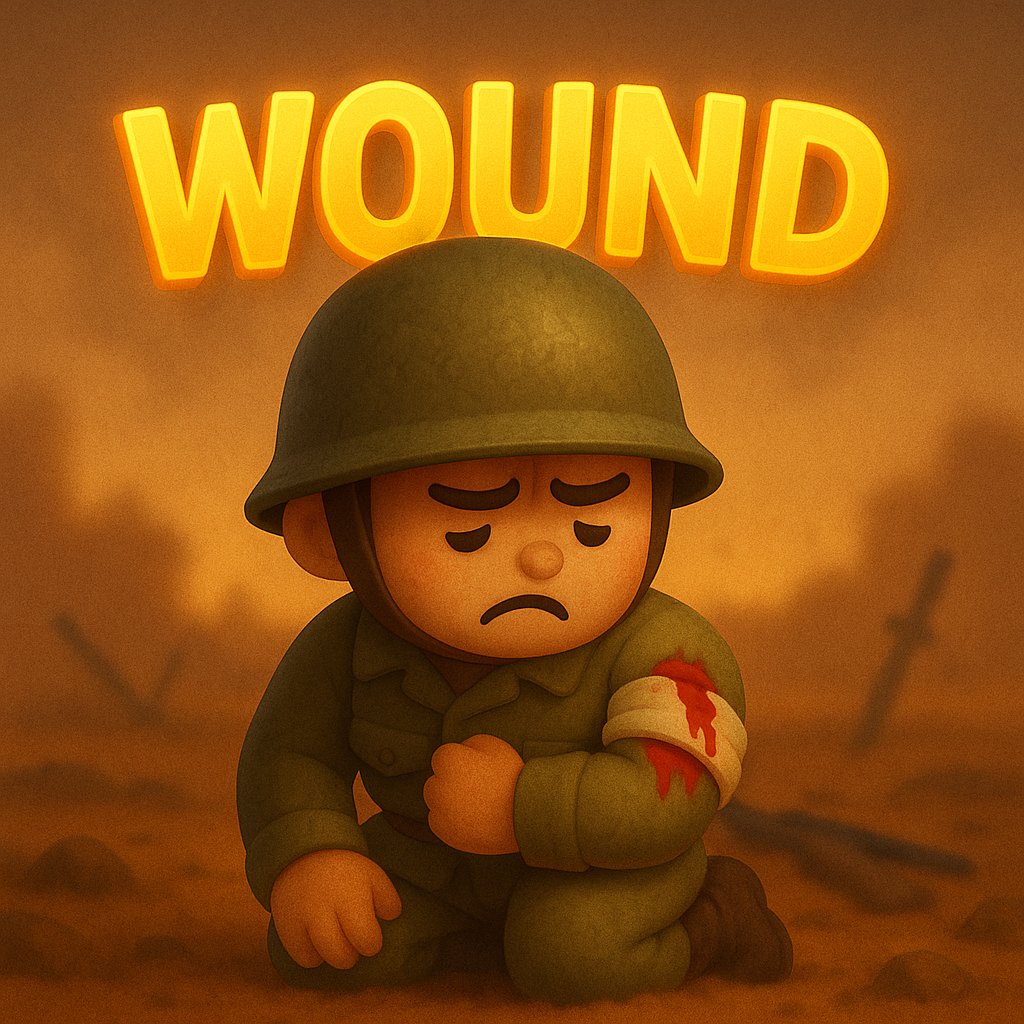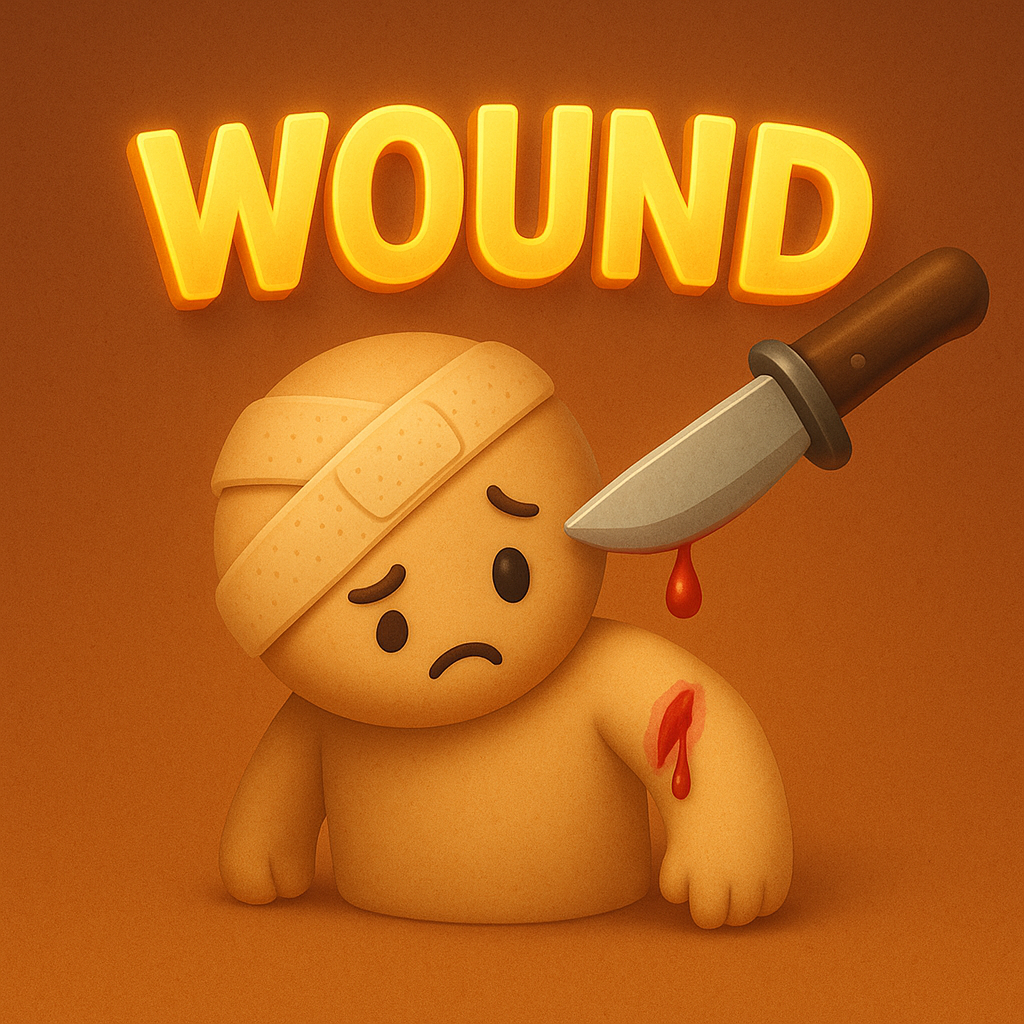Wound
Definition
Wound can refer to an injury to the body involving the skin, tissues, or organs, typically caused by an external force. It can also describe emotional distress or pain. Additionally, as a verb, it refers to the act of inflicting such an injury.
Parts of Speech
- Noun
- Verb
Pronunciation
American English
- IPA Pronunciation (Noun/Verb): /wuːnd/
- Respelling: WOOND
British English
- IPA Pronunciation (Noun/Verb): /wuːnd/
- Respelling: WOOND
Etymology
The word "wound" originates from Old English "wund," meaning "an injury or hurt." It is derived from Proto-Germanic "wundō," with roots in Proto-Indo-European "wendh-" meaning "to wound or strike."
Derivatives
- Wounded (adjective)
- Wounding (noun/verb)
- Unwounded (adjective)
- Woundable (adjective)
- Rewound (verb)
Synonyms
- Injury
- Trauma
- Lesion
Antonyms
- Healing
- Recovery
- Wholeness
Usage
The noun "wound" is often used to refer to physical injuries, such as "He suffered a deep wound on his arm." As a verb, it describes the act of causing such injuries, for example, "The broken glass wounded her hand."
Related Terms
- Scar: A mark left after a wound has healed.
- Injury: Physical harm caused by an accident or attack.
- Healing: The process of recovery from a wound or injury.
Detailed Definitions
Noun
- A physical injury to the body: Refers to damage to the skin, tissues, or organs caused by an external force.
- Example: "The soldier received a serious wound during the battle."
- Emotional or psychological harm: Describes mental or emotional distress or trauma.
- Example: "Her harsh words left a deep emotional wound."
Verb
- To inflict an injury: Describes the act of causing physical harm to someone or something.
- Example: "The knife wounded him severely."
- To cause emotional distress: Refers to actions that emotionally hurt someone.
- Example: "Her betrayal wounded his pride."
wound



🇨🇳 Mandarin Chinese
- 伤口 (wound, as an injury)
- IPA: /ʂɑŋ˥ kʰoʊ̯˧˥/
- English Respell: shāngkǒu
- 卷 (wound, as in twisted or turned something)
- IPA: /tɕɥɛn˨˩˦/
- English Respell: juǎn
🇮🇳 Hindi
- घाव (wound, as an injury)
- IPA: /ɡɦɑːv/
- English Respell: ghāv
- मोड़ा हुआ (wound, as in twisted or turned something)
- IPA: /moɽaː ɦʊaː/
- English Respell: moṛā huā
🇪🇸 Spanish
- Herida (wound, as an injury)
- IPA: /eˈɾiða/
- English Respell: herida
- Enrollado (wound, as in twisted or turned something)
- IPA: /en.roˈʎa.ðo/
- English Respell: enrollado
🇫🇷 French
- Blessure (wound, as an injury)
- IPA: /blɛ.syʁ/
- English Respell: blessure
- Enroulé (wound, as in twisted or turned something)
- IPA: /ɑ̃.ʁu.le/
- English Respell: enroulé
🇦🇪 Arabic (Modern Standard)
- جرح (wound, as an injury)
- IPA: /d͡ʒarħ/
- English Respell: jarh
- لف (wound, as in twisted or turned something)
- IPA: /laf/
- English Respell: laf
🇧🇩 Bengali
- আঘাত (wound, as an injury)
- IPA: /aːɡʱat̪/
- English Respell: āghāt
- মোড়ানো (wound, as in twisted or turned something)
- IPA: /moɽano/
- English Respell: moṛānō
🇷🇺 Russian
- Рана (wound, as an injury)
- IPA: /rɐˈna/
- English Respell: rana
- Завёрнутый (wound, as in twisted or turned something)
- IPA: /zɐˈvʲɵrnʊtɨj/
- English Respell: zavyornuty
🇵🇹 Portuguese
- Ferida (wound, as an injury)
- IPA: /fɨˈɾidɐ/
- English Respell: ferida
- Enrolado (wound, as in twisted or turned something)
- IPA: /ẽȷ̃ʁuˈladu/
- English Respell: enrolado
🇮🇩 Indonesian
- Luka (wound, as an injury)
- IPA: /lu.ka/
- English Respell: luka
- Menggulung (wound, as in twisted or turned something)
- IPA: /məŋ.ɡu.luŋ/
- English Respell: menggulung
🇩🇪 German
- Wunde (wound, as an injury)
- IPA: /ˈvʊndə/
- English Respell: Wunde
- Aufgewickelt (wound, as in twisted or turned something)
- IPA: /aʊ̯f.ɡəˈvɪkl̩t/
- English Respell: aufgewickelt
🇯🇵 Japanese
- 傷 (wound, as an injury)
- IPA: /kizu/
- English Respell: kizu
- 巻いた (wound, as in twisted or turned something)
- IPA: /maita/
- English Respell: maita
🇻🇳 Vietnamese
- Vết thương (wound, as an injury)
- IPA: /vɛt̚˧ˀ˨ʔ tʰwəːŋ˧˥/
- English Respell: vết thương
- Cuốn (wound, as in twisted or turned something)
- IPA: /kʊən˧˥/
- English Respell: cuốn
🇰🇷 Korean
- 상처 (wound, as an injury)
- IPA: /saŋ.tɕʰʌ/
- English Respell: sangcheo
- 감았다 (wound, as in twisted or turned something)
- IPA: /ka.mʌt̚.t͈a/
- English Respell: gamatda
🇹🇷 Turkish
- Yara (wound, as an injury)
- IPA: /jaˈɾa/
- English Respell: yara
- Sardı (wound, as in twisted or turned something)
- IPA: /saɾˈdɯ/
- English Respell: sardı
🇵🇰 Urdu
- زخم (wound, as an injury)
- IPA: /zəxm/
- English Respell: zakhm
- گھمایا ہوا (wound, as in twisted or turned something)
- IPA: /ɣʊmaːjaː ɦʊwɑː/
- English Respell: ghumāyā huā





